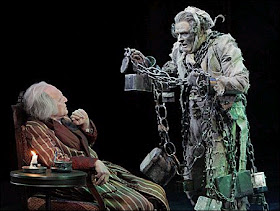Men -- Don't Let This Happen To You!
As today is Christmas Eve, I thought we would visit with the only carol actually mentioned in A Christmas Carol by Charles Dickens:
Foggier yet, and colder! Piercing, searching, biting cold. If the good Saint Dunstan had but nipped the Evil Spirit's nose with a touch of such weather as that, instead of using his familiar weapons, then indeed he would have roared to lusty purpose. The owner of one scant young nose, gnawed and mumbled by the hungry cold as bones are gnawed by dogs, stooped down at Scrooge's keyhole to regale him with a Christmas carol: but at the first sound of --God bless you, merry gentleman! May nothing you dismay!
Scrooge seized the ruler with such energy of action, that the singer fled in terror, leaving the keyhole to the fog and even more congenial frost.
God Rest Ye Merry, Gentlemen was an amazingly ubiquitous coral during the age of Victoria. In fact, William Henry Husk in The Songs of the Nativity (1868) writes: There is no carol, perhaps, so universally known as this. Many, who have heard no other carol, are familiar with " God rest you, merry gentlemen," and speak of it as the Christmas carol. The only carols which at the present time in any degree approach it in point of popularity are "The Seven Joys," and "The Sunny Bank," which many of the broadside printers annually associate with it on the same sheet; accompanied of late years by an English translation of the Latin Christmas hymn, "Adeste, fideles," under the title of the Portuguese Hymn, or as one worthy printer calls it "A favourite Christmas Hymn, translated from the Portuguese," ignorant of the fact that its title of "Portuguese," was given to it by an English nobleman who was a director of the Concerts of Ancient Music and introduced the hymn there, having previously heard it sung at the Chapel of the Portuguese embassy in South Street, Grosvenor Square, and assuming it to be a Portuguese composition. As may be expected of a piece so often printed and sung in districts so widely separated there are several variations in the different copies of this carol, but the version here printed seems the most generally received, and is perhaps the most genuine.
The actual author of God Rest Ye Merry is unknown, though most scholars believe it was written sometime between 1780 and 1800. Many people today are often puzzled by the opening line, which actually means: may God make you happy, gentlemen. Dickens, by moving the comma over one word, has accidently changed its meaning, assuming that the gentlemen were merry to being with.God rest you merry, gentlemen,
Let nothing you dismay.
For Jesus Christ our Savior,
Was born on Christmas Day;
To save us all from Satan’s power,
When we were gone astray.
Chorus
O tidings of comfort and joy,
For Jesus Christ our Savior
Was born on Christmas day.
In Bethlehem, in Jury,
This blessed Babe was born,
And laid within a manger,
Upon this blessed morn;
The which His mother Mary
Did nothing take in scorn.
Chorus
From God our heavenly Father,
A blessed angel came.
And unto certain shepherds,
Brought tidings of the same,
How that in Bethlehem was born,
The Son of God by name:
Chorus
Fear not, then said the Angel,
Let nothing you affright,
This day is born a Savior,
Of virtue, power, and might,
So frequently to vanquish all,
The friends of Satan quite;
Chorus
The shepherds at those tidings,
Rejoiced much in mind,
And left their flocks a feeding,
In tempest, storm, and wind,
And went to Bethlehem straightway,
This blessed babe to find:
Chorus
But when to Bethlehem they came,
Whereas this infant lay
They found him in a manger,
Where oxen feed on hay;
His mother Mary kneeling,
Unto the Lord did pray:
Chorus
With sudden joy and gladness
The shepherds were beguiled,
To see the Babe if Israel,
Before His mother mild,
O then with joy and cheerfulness
Rejoice, each mother's child.
Chorus
Now to the Lord sing praises,
All you within this place,
And with true love and brotherhood,
Each other now embrace;
This holy tide of Christmas,
Doth bring redeeming grace.
Chorus
God bless the ruler of this house,
And send him long to reign,
And many a merry Christmas
May live to see again;
Among your friends and kindred
That live both far and near.
Alternate Chorus:
That God send you a happy new year,
Happy new year,
And God send you a happy new year.

Merry Christmas buddy! Thanks for all the great posts!
ReplyDeleteExcept that all Victorians would have known that it could not possibly have been called "God rest you..." Anyone with even an elementary education at that time would have known that the second person plural, now forgotten, in English is "ye".
ReplyDeleteOnly we ignorant unlettered moderns have forgotten the reason the title and first line are "God rest ye merry gentlemen..."